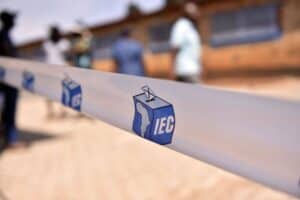For many voters, this year’s Halloween election is a scary prospect and for political parties with the lowest turnout yet forecast, a potential crisis.

Political parties contesting the 1 November municipal elections don’t just have one another to battle at the polls.
One of the biggest threats to the upcoming polls is voter apathy and, according to a recent paper by Collette Schulz-Herzenberg of the Konrad-Adenuaer Foundation, South Africa’s voter turnout at election time has been in a steady decline since 1994.
Added to this, the large neutral collective measured by online sentiment and digital analysis hints that many citizens just have no idea who to vote for.
For many voters, this year’s Halloween election is a scary prospect and for political parties with the lowest turnout yet forecast, a potential crisis.
Between 2014 and 2019’s national elections, participation of registered voters declined by 8% to 66%. In 1994, voting age participation in elections stood at 86%. In total, actual voters turning up to vote had dropped by 37% by 2019.
“Online research suggests that South Africans really do not know who to vote for,” says digital analyst Carmen Murray.
“There is a big sense of uncertainty.” She adds that while Meltwater sentiment analysis shows some gains and losses on the positive and negative side, the apathy-riddled and undecided middle is where the battle should be.
“More than 60% of people are not planning to vote or have no idea where to make their mark.”
Voter turnout is a crucial indicator of the health and vitality of a democracy, wrote Shulz-Herzenberg, adding that low voter turnout is associated with apathy and mistrust of the political process. The paper suggests that the steady decline in voting raises important questions about civic engagement and citizen involvement in politics and a decline of trust in the political system.
And while net growth of the voters’ roll remains positive approaching every election, says the paper, the gap between eligible voters and those registering is widening.
Murray says that online conversations have seen politicians mostly talk to themselves, slinging mud and insults in any direction while the public look on.
“Very limited participation is visible. Politicians are doing a great job of alienating people.”
She says the Economic Freedom Fighters’ (EFF) Julius Malema may be the most popular leader right now, but it’s not a litmus for what may happen at the polls.
“The party that gets people away from their election day braai to queue at a voting station, that is the party who will make it.
“The DA [Democratic Alliance] are celebrating themselves in indulgent propaganda while the ANC’s promises seem to forget what people are pointing out elsewhere, that they got [South Africa] into this mess in the first place.”
Online movement shows that the EFF, ANC and DA are the most at-risk of apathy.
“Smaller parties and fringe movements like the Patriotic Alliance, the Good Party of Patricia de Lille and the Freedom Front Plus may be somewhat insignificant online but seem to be working off a stronger and more active support base,” says Murray.
“The dark horse gaining tremendous traction right now across all population groups is Herman Mashaba’s ActionSA.”
Murray adds that the Covid pandemic has also accelerated social change.
“A habit is formed between 21 and 66 days,” she says, “and South Africa has been in lockdown for almost 600 days.”
“Social listening shows that for anyone to leave home requires a compelling reason to do so. Whether voting on 1 November is enough of a reason, is anyone’s guess.”






